Introduction
An irrevocable trust is a legal entity that can be used to protect assets from creditors, reduce estate and gift taxes, and provide estate planning options. It is a powerful tool that can be used to ensure that assets are passed on to beneficiaries according to the wishes of the grantor. However, it is important to understand how an irrevocable trust works before setting one up. In this article, we will explore the benefits and drawbacks of an irrevocable trust, the process of setting one up, and the tax implications associated with it.

Exploring the Benefits and Drawbacks of an Irrevocable Trust
An irrevocable trust has several advantages, but there are also some drawbacks to consider. Let’s take a look at both sides of the equation.
Advantages
One of the main advantages of an irrevocable trust is asset protection. Assets placed in the trust are not available to creditors and cannot be included in any bankruptcy proceedings or lawsuits. This makes it a powerful tool for protecting assets and ensuring they are passed on to the intended beneficiaries.
In addition, an irrevocable trust can be used as part of an overall estate plan. It can be used to ensure that assets are distributed according to the wishes of the grantor, and it can be used to minimize estate and gift taxes. Finally, an irrevocable trust can also be used to avoid probate, which can save time and money.
Disadvantages
The main disadvantage of an irrevocable trust is the loss of control over the assets. Once assets have been placed in the trust, the grantor no longer has direct access to them. This means that the grantor must rely on the trustee to manage the trust and make decisions about how the assets are used.
In addition, there may be restrictions on how the funds in the trust can be used. For example, the grantor may not be able to use the funds for their own benefit, or the trustee may have to follow specific instructions when managing the trust. Finally, there is a cost associated with setting up an irrevocable trust, which can be significant depending on the complexity of the trust.

The Process of Setting Up an Irrevocable Trust
Setting up an irrevocable trust involves several steps, including choosing a trustee, deciding what assets will be included, drafting the trust document, and funding the trust. Let’s take a closer look at each step.
Choosing a Trustee
The first step in setting up an irrevocable trust is to choose a trustee. The trustee is responsible for managing the trust and carrying out the instructions of the grantor. The trustee can be a family member, friend, or professional such as a lawyer or accountant. It is important to choose someone who is trustworthy and knowledgeable about the trust.
Deciding What Assets Will Be Included
The next step is to decide which assets will be included in the trust. This could include cash, investments, real estate, and other types of property. It is important to carefully consider which assets should be included so that the trust can achieve its goals.
Drafting the Trust Document
Once the trustee and assets have been chosen, the next step is to draft the trust document. This is a legal document that outlines the terms of the trust, including the duties of the trustee, the rights of the beneficiaries, and the rules for distributing assets upon death. It is important to work with a professional to ensure that the document is properly drafted.
Funding the Trust
The final step in setting up an irrevocable trust is funding the trust. This involves transferring ownership of the assets from the grantor to the trust. Depending on the type of assets, this can involve signing documents such as deeds or transfer forms. It is important to ensure that all assets have been transferred correctly.
Understanding the Tax Implications of an Irrevocable Trust
When setting up an irrevocable trust, it is important to understand the tax implications. One of the most common taxes associated with trusts is the gift tax. This is a federal tax that applies when a person gives away more than $15,000 in a single year. There may also be state gift taxes that apply.
In addition, income generated by the trust may be subject to income taxes. The trustee is responsible for filing the necessary tax returns and paying any taxes due. Finally, an irrevocable trust may be subject to estate taxes if the value of the trust exceeds the federal exemption amount.

Working with a Professional to Create an Irrevocable Trust
It is generally recommended that a professional be consulted when setting up an irrevocable trust. There are several reasons why this is important. A professional can help ensure that the trust is set up correctly and meets all legal requirements. They can also provide advice on the best way to structure the trust and how to minimize taxes.
When looking for a professional to help with an irrevocable trust, it is important to consider the type of professional needed. An attorney is typically the best option, as they can provide legal advice and ensure that the trust is properly drafted. However, a financial planner or accountant may also be consulted for advice on taxes and investments.
Finally, it is important to understand the costs associated with creating an irrevocable trust. Fees vary depending on the complexity of the trust and the type of professional consulted, but they can range from a few hundred dollars to several thousand.
Conclusion
An irrevocable trust is a powerful tool for asset protection and estate planning. It has several advantages, such as asset protection, estate planning, and tax savings. However, there are also some drawbacks, such as the loss of control over the assets and restrictions on access to funds. Setting up an irrevocable trust involves choosing a trustee, deciding what assets to include, drafting the trust document, and funding the trust. It is important to understand the tax implications of an irrevocable trust, as well as the costs associated with setting one up. Working with a professional is generally recommended to ensure the trust is set up correctly.
(Note: Is this article not meeting your expectations? Do you have knowledge or insights to share? Unlock new opportunities and expand your reach by joining our authors team. Click Registration to join us and share your expertise with our readers.)
